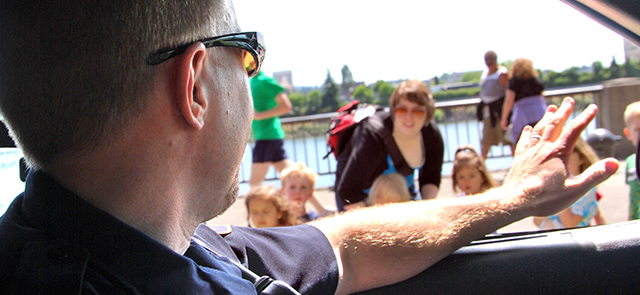City Council unanimously approved 12 new Police Bureau positions in December, implementing a community policing model Mayor Ted Wheeler campaigned on. The positions are the city’s latest effort to address rising crime rates and increased demand for police services.
The recruits, called Public Safety Support Specialists (PS3s), “will generally serve as ambassadors of goodwill for the Bureau in the community,” Wheeler explained in a Council session. The 12 specialists will address low level, nonviolent incidents that do not require a sworn officer. They’re expected to be dispersed evenly throughout the three Portland police precincts.
Why this program?
Portland police reform advocates have spent years calling for a greater shift toward community policing, a philosophy that prioritizes personal connections between officers and the public. “Portland’s actually a little behind the curve on this” said Nicole Grant, a senior policy advisor to Wheeler who helped devise the PS3 program. Grant and other advocates have looked to cities such as Eugene and Gresham for guidance, as they have long employed community policing strategies.
Calls for Portland police service have increased 29 percent since 2013, and crime rates have followed a similar trend. According to available Police Bureau data, city-wide violent crime is up 16 percent since 2016. Among our neighborhoods, the Pearl District has seen the most dramatic increase, with violent crime nearly doubling in the last two years. As response times and Bureau vacancies rise, Portlanders are searching for solutions.
What will PS3s do?
Police officers conduct many duties that do not require their level of training, such as welfare checks, vehicle break-in reports and other nonviolent calls for service. The specialists will ideally alleviate these burdens, freeing sworn officers to address more demanding calls.
PS3s will also attend community events and strive to build relationships with the public. To distinguish themselves from sworn officers, they will wear polos with a Bureau patch and will not carry firearms.
How will they be trained?
The positions are currently open to applicants 21 years or older with a high school degree or GED, and two years of work experience or military experience. Once hired, the specialists will undergo six weeks of training by the Police Bureau that will include first aid and de-escalation trainings.
Critics of the program argued the city should have consulted the public more in the planning stage. “I profoundly disagree,” Wheeler said. “I ran on this platform.” Grant and her Bureau partners will report back to City Council on the pilot’s efficacy in one year.

